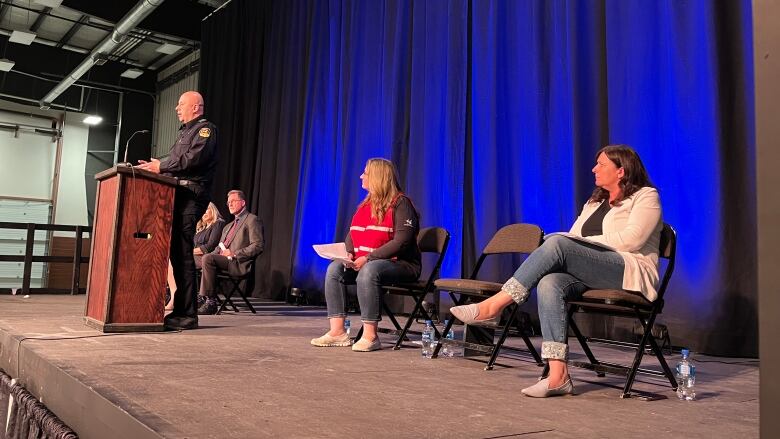Alberta wildfires create complex conditions for crisis communicators, experts say
'Each and every one of those individuals is doing the best they can,' crisis leader says

Crisis communications professionals say the Alberta wildfires have created a complex, constantly changing environment for authorities trying to share information with the public.
Evacuees have complained about communication from the provincial and local governments over the past week, mentioninginformation gaps, problems with the province's emergency alert system and conflictinginformation between sources.
At a town hall attended by hundreds of people in northwestern Alberta Monday night, communication emerged as a common theme, with residents questioning how information was distributed and asking for photographs of evacuated areas.
"There were definitely a lot of concerns around communication, around ensuring that we're providing frequent updates with information that they're looking for," said Trevor Grant, fire chief for the County of Grande Prairie and an emergency operations centre section chief, after the meeting.
Three Albertans with expertise in crisis and wildfire communications say this spring's wildfires present unique challenges for those in charge of disseminating information.
They say many people sharing information with the public are likely members of the communities under evacuation, workinglong hours and under tough conditions.
"It's really important to recognize the stressors that they're feeling and the choices that they've made consciously to help the community, often at the expense of their own homes and their families," said Daryl Black, an Edmonton resident who has worked in crisis leadership and emergency management for more than 30 years.
Black said many people who worked in emergency coordination centres during the pandemic are now working on the wildfire response, likely still experiencing fatigue and burnout as they try to make quick decisions.
"Each and every one of those individuals is doing the best they can," said Black, who was involved in responses to the Chuckegg Creek and Fort McMurray wildfires.
Changing conditions
Matthew Lemon, an instructor for the disaster and emergency management program at NAIT, said communicating during a crisis is always challenging, but even more so now with so many fires burning.
"Wildfire behaviours change rapidly, it really depends on weather shifts and environmental conditions, and although we would like all the information we can possibly get right now, that's not always possible," he said.
Lemon said evacuees are understandably concerned about the state of their homes, but accessing some areas and conducting damage assessments might not yet be safe for first responders.
Stephen Lacroix, managing director of the Alberta Emergency Management Agency, said on Saturday that smoke was so thick, observers survey areas by plane could not see properties.
Lemon said crisis communicators are well-trained and they focus on sharing what they know, what authorities are currently doing and what others can do in response.
Building trust, being concise and sharing timely and accurate information is important, he said.
16-hour days
Numerous post-wildfire reports have focusedon communication gaps and mixed messagesshared with residents.
"When we talk about communications, I think it's really easy to look at them as being potentially not good enough or they aren't meeting specific needs, but they're very complex and very difficult to manage," said Jordan Redshaw, a director at National Public Relations.
Redshaw spent three and a half years living and working in Fort McMurray, managing communications for the Regional Municipality of Wood Buffalo during the 2016 wildfire and leading communications during the recovery. He now lives in Calgary.
He said wildfires are particularly challenging, from a communications perspective, because of the changing conditions, uncertainty and multiple jurisdictions of authority.
During the initial response to the wildfire, Redshaw and his colleagues worked for 40 hours straight, even as they were ordered to evacuate twice. He said the team subsequently worked 16-hour days for weeks.
"I understand and I truly do empathize with the experience of being evacuated and not being able to access your home, the interruption to the livelihoods and to businesses," he said.
"There are people who are working really hard in there, I guarantee you, giving up a lot, taking time away from their families to put the community first."












_(720p).jpg)


 OFFICIAL HD MUSIC VIDEO.jpg)
.jpg)



























































































